In Iowa, a Trump win appears inevitable. Is the fight to catch him meaningful or delusional?
- Oops!Something went wrong.Please try again later.
- Oops!Something went wrong.Please try again later.
Many Iowa Republicans have now accepted that Donald Trump, who holds an enduring and unshakeable lead over the GOP presidential field, is very likely — perhaps all but certain — to win the Jan. 15 Iowa Caucuses.
For everyone else, it’s a battle for second place.
New results from the latest Des Moines Register/NBC News/Mediacom Iowa Poll drive home the point.
Trump holds an authoritative lead at 43%, while former United Nations Ambassador Nikki Haley and Florida Gov. Ron DeSantis tie for a distant second place at 16%.
Every other candidate in the nine-person field is mired in single digits.
“I do believe that there are only two tickets out of Iowa — and Trump has punched his,” said Jimmy Centers, an Iowa Republican political consultant.
The poll results highlight a stark reality: Despite more than 500 campaign appearances between them and tens of millions of dollars spent on the airwaves and on the ground, the Republican field is mostly stagnant.
Haley is the only candidate showing marked upward momentum, gaining 10 points since August, and she and DeSantis still trail Trump by nearly 30 percentage points.
Meanwhile, the former president has campaigned in Iowa far less than his counterparts, he has refused to participate in the debates and he is facing 91 felony charges spanning four separate criminal indictments.
And yet, his nomination has begun to feel all but inevitable.
Big donors are increasingly throwing up their hands and pulling their funds from other candidates.
The Washington Post Style section has dubbed this “the make-believe Republican primary” — a bit of political theater that does little to influence the result.
And U.S. Sen. Tim Scott’s super PAC has pulled its fall TV advertising after concluding that Iowa voters aren’t open for now to Trump alternatives.
But some of those who oppose Trump still see a narrow path to overtake him, and it hinges on the outcome of Iowa’s first-in-the-nation contest.
Even with Trump’s dominating lead, they say, the fight for second place is critical.
"It feels to me like Iowa's going to be more important than ever — not necessarily as a Trump-killer, because that's not what this looks like,” said veteran caucus operative David Kochel. “But it certainly should (winnow) the rest of the field so that we can get to South Carolina with a head-to-head contest. That's really what this race needs in order for anybody to have even a remote shot at Trump. It's got to be one on one. And even then, it's no guarantee.”
Centers said the winnowing needs to happen even faster, with a clear Trump alternative emerging out of Iowa in time to face Trump head to head in New Hampshire.
“If that doesn't happen, it's over,” he said. “It is over.”
Late surges are common in the Iowa caucuses, but Donald Trump's lead might be too much to overcome
In arguing that their trailing campaigns are still relevant, Trump’s opponents routinely note that past caucus winners have been known to surge in December and January and surprise pundits and prognosticators on Caucus Day.
In an Oct. 30 interview with Hugh Hewitt, Scott noted that Republicans Herman Cain and Ben Carson were leading the Register’s Iowa Polls in October of 2011 and 2015. Neither went on to win the caucuses.
“It’s one of the reasons why we’re heading to Iowa and staying there consistently,” Scott said. “Because we realize that, historically speaking, Iowa voters, they break late in the cycle. And that’s great news, having an opportunity for us to continue to share our message.”
Belief in a late surge can sound like a bit of delusional faith on the part of candidates polling in the single digits, or a way to rationalize their participation in the process.
But it is true — to a degree.
“I think everyone needs to be clear eyed with their expectations that you're not going to surge to a first-place finish,” Centers said. “The best you can hope for at this stage of the game with the current field is surging to a strong second-place finish where there's a wide (gap) between you and third. There isn't a meteoric rise with the ‘Chuck Truck’ and Rick Santorum winning the Iowa caucus. That is not possible in my opinion right now.”
(In the 2012 cycle, campaign aide Chuck Laudner famously drove Santorum around Iowa in his Dodge Ram pickup for months to events that drew a handful of people, before Santorum's late surge.)
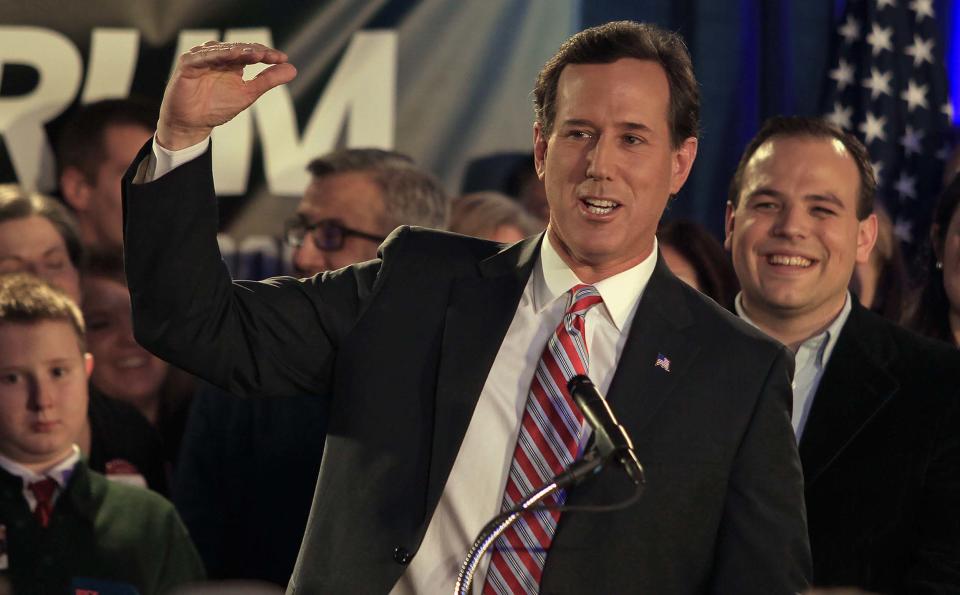
Ahead of the 2008 Republican caucuses, former Arkansas Gov. Mike Huckabee was at 12% in the Register’s October Iowa Poll before surging 22 percentage points to win with 34%.
Santorum was at 5% in October 2011, gaining about 20 percentage points to win the caucuses at 25%.
And U.S. Sen. Ted Cruz of Texas rose from 10% in October 2015 to win the caucuses with about 27% — an 18-point rise.
A similar trajectory would put Haley or DeSantis around 36% on Caucus Day — still 7 percentage points behind the 43% where Trump currently sits.
But it is within striking distance, and close enough to potentially breathe new life and energy into a campaign headed into New Hampshire and South Carolina.
The Iowa Poll shows there’s room for Trump’s challengers to surge in Iowa.
Overall, 67% of likely Republican caucusgoers say they are actively considering caucusing for Trump, including those who name him their first or second choice for president. However, 67% of caucusgoers say they also are actively considering caucusing for DeSantis.
Although Haley is tied with DeSantis overall, the poll shows she has a smaller universe of people considering her, at 54% (although that’s up from the 40% who were considering her in August).
Scott follows with 49% who say they are considering him.
Still, more of Trump’s supporters are enthusiastic about their candidate, and they’re more locked in, the poll found, making any kind of challenge difficult.
“If Iowa is your hill to die on, I hope you've packed a lot of provisions,” Centers said. “Because it is an extremely uphill climb, and the former president has his foot on the gas. His campaign is leaving nothing to chance.”
The field could consolidate, but that might actually boost Trump
Despite the desire among many Republicans for the field to coalesce around one “not Trump” candidate, the Iowa Poll shows there’s significant overlap between the candidates’ supporters.
Because of that, if other candidates pull out of the race, their supporters could flip to Trump, and his lead would grow.
Of those who name DeSantis as their first choice for president, 27% name Haley as their second choice. Yet 41% say their second choice is Trump.
According to poll data, if DeSantis were to end his campaign and his supporters went with their second-choice candidate, Trump’s lead would grow to 50%. Haley would follow in second place with 21% and Scott would come in third at 8%.
Haley’s supporters are more likely to name someone other than Trump as their second choice.
Thirty-four percent of her first-choice supporters pick DeSantis as their second choice for president, 19% select Scott and 14% choose Burgum. Just 12% say Trump is their second-choice candidate.
If she were to end her campaign and her supporters shifted their allegiance to their second-choice candidate, Trump’s lead would grow only slightly to 45%, based on the latest Iowa Poll results. DeSantis would follow at 22% and Scott would remain in third place with 10%.
“I think that those votes are up for grabs for anyone, and I think that (the Register’s) polling shows that,” said Nicole Schlinger, a Republican political consultant in Iowa. “And when I say up for grabs for anyone, those votes could go to Trump. So I don't think it's necessarily a given that winnowing the field changes the dynamic of the race in the way (people are) suggesting.”
Campaigns increase their Iowa presence, but Trump is still ‘900 pound gorilla’
Each of the top four finishers in the latest Iowa Poll have indicated they plan to increase their presence in Iowa to try to manifest that late-caucus surge.
Trump has ramped up his campaign schedule, and a super PAC backing him has begun airing TV ads.
DeSantis, who already had a substantial super PAC presence in Iowa, has shifted campaign staff and resources into Iowa while expediting a round of planned TV ads.
Scott has said it’s “Iowa or bust.”
And Haley has also grown staff, hiring a couple of veteran Iowa hands to help harness her momentum after the last debate. But her organizational footprint is smaller than many of her competitors'.
“The question for her, in my mind is: Can she put together an organization on the fly to harness this energy?” Centers said. “Because 10 points in a couple months in the polls is nothing to sneeze at. That's really impressive. But you've got to harness that energy and keep the momentum going for a few more months. … She has to build out an organization, and I think her team knows that.”
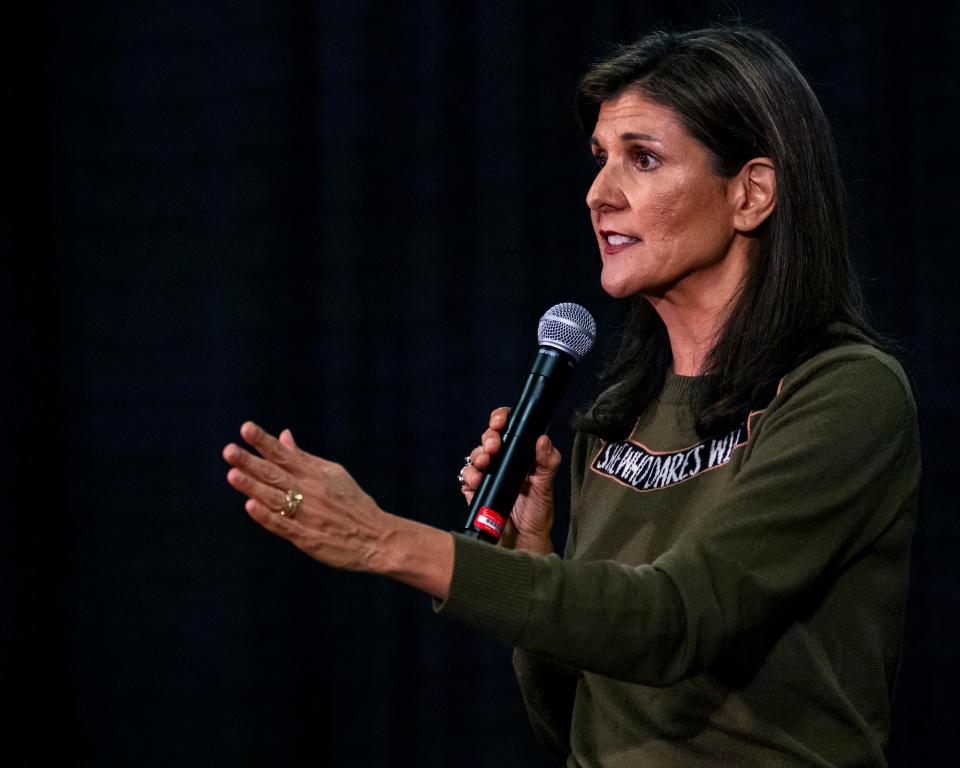
Schlinger said it looks like candidates are on the verge of substantially growing out their grassroots organizations. But so far, she said, none rivals the grassroots machine Cruz fielded in 2016.
“I think that there's a lot more room for these candidates to grow when it comes to grassroots organizations,” she said. “… I've been part of a strong grassroots campaign that had fervent support from people all across the state, and I think that's what I'd like to see.”
Centers said he thinks the sophistication of Trump’s field operation is often underappreciated because it tends to fly under the radar.
“They're not rolling out all of their county chairs in big splashy press releases,” he said. “They let their candidate be the 900-pound gorilla, and he dominates everything. But quietly behind the scenes, they have built one heck of an organization.”
Candidates look to a ‘wide-open’ evangelical lane for momentum, but evangelicals prefer Trump
Scott has shifted his entire campaign apparatus to Iowa with an eye to a “wide-open evangelical lane” he hopes will energize his stagnating showing.
It’s a strategy that reflects the high impact that evangelical Christians, who tend to turn up to caucus in disproportionately high numbers, can have on the race.
In 2016, they made up 64% of Republican caucusgoers, and their support of Cruz over Trump helped push the Texas senator into a first-place finish.
Scott, who frequently quotes Scripture on the campaign trail, appears to be an obvious envoy to that bloc of caucusgoers.
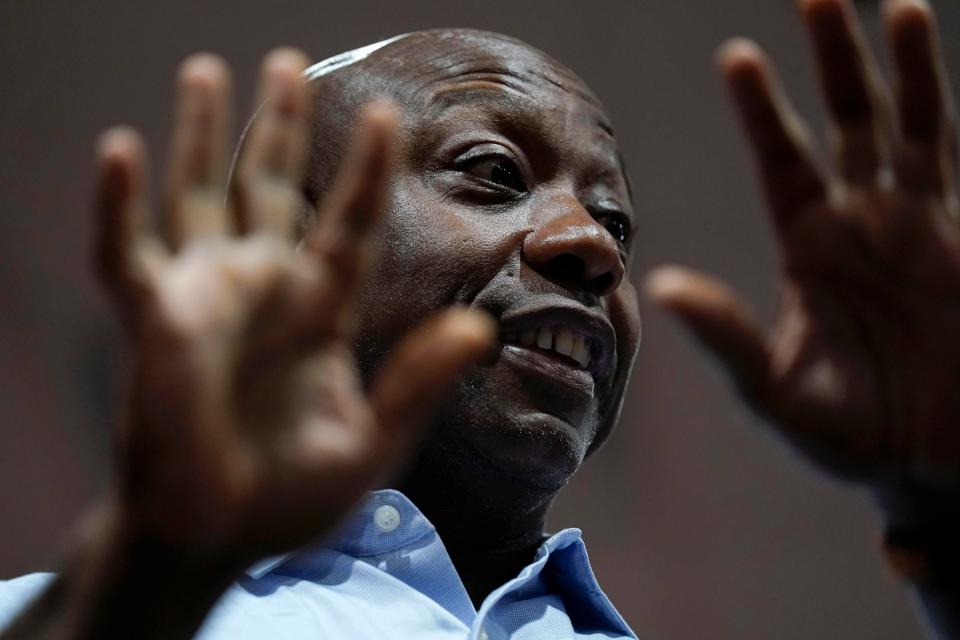
But Trump leads with that group as well.
Among evangelicals who say they are likely to attend the Republican caucus, 44% say Trump is their first choice for president — a number that mirrors his overall support.
That’s about equal to the combined evangelical support for DeSantis, who is at 22%; Haley, who is at 15%; and Scott, who gets 8%.
Those numbers come as several leaders of Iowa’s evangelical community have called for people to move on from Trump — Family Leader president and CEO Bob Vander Plaats chief among them. But so far, there have not been indications that those leaders are coalescing around an alternative.
Vander Plaats, who is still weighing a decision to endorse, said the need to see the non-Trump lane unify is on his mind as he considers his options.
“There's a lot more that brings that group together than say separates them and divides them,” he said. “And that's why I believe the big question is: Who can win?”
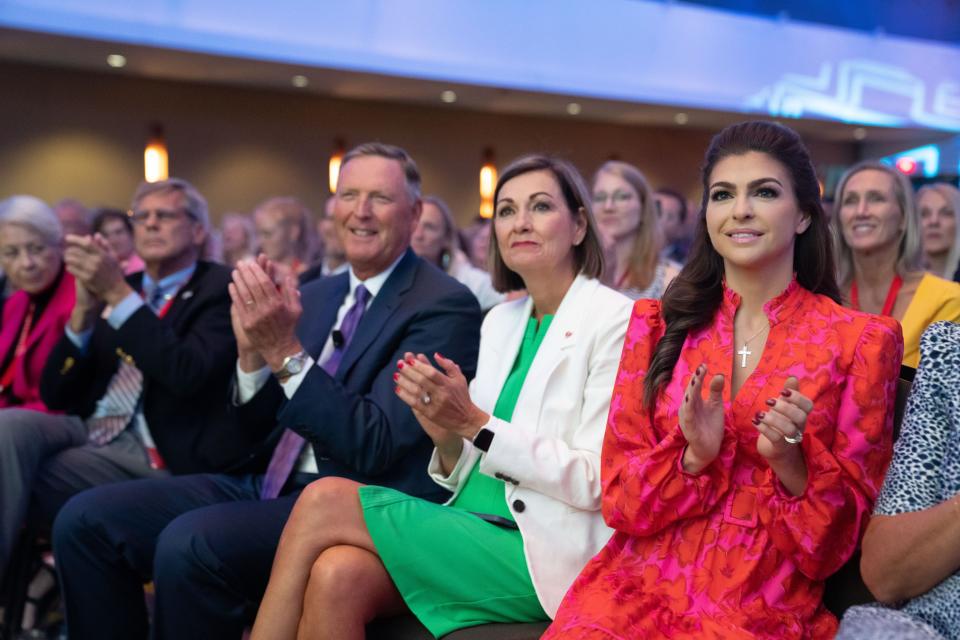
Vander Plaats said part of being seen as electable means amassing enough resources to be competitive in later states and in a general election. That hasn’t always been part of evangelicals’ calculus when they rallied behind candidates like Santorum and Huckabee, he said, but it probably helped Cruz in 2016.
According to the poll, DeSantis is viewed favorably by the most evangelical caucusgoers, more so even than Trump.
According to the poll, 76% of evangelicals say they have a positive view of the governor and 20% say they have a negative view. Another 4% are not sure.
With Trump, 72% of evangelicals view him favorably and 28% unfavorably. He is universally known, with 0% saying they are not sure about him.
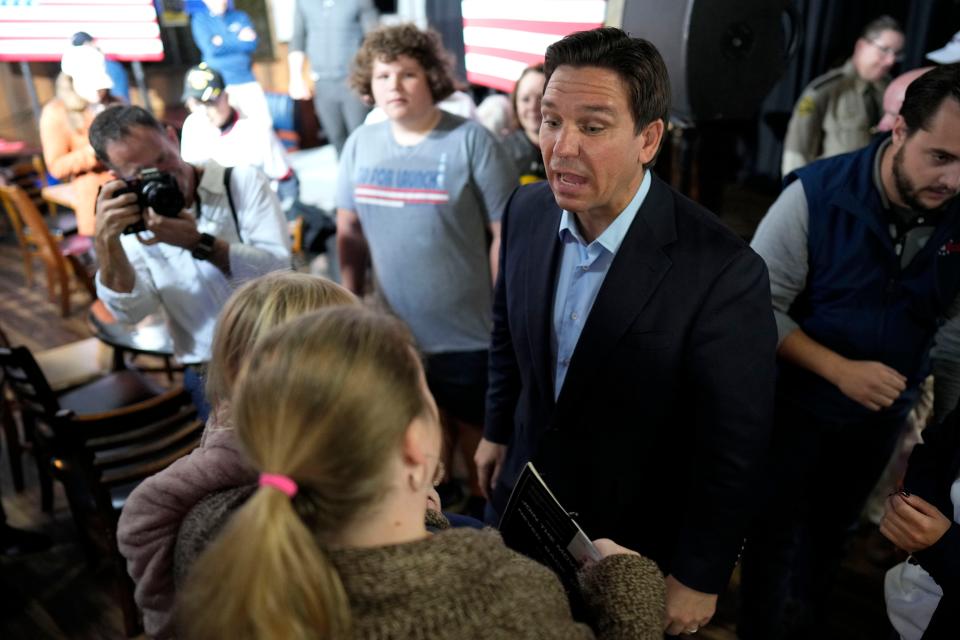
Scott is viewed favorably by 67% and unfavorably by 18% of evangelicals, with 15% who are not sure.
And Haley is viewed favorably by 62% and unfavorably by 28%. Another 10% are not sure.
Vander Plaats said he is not aware of any formal effort within the evangelical community to pick a Trump alternative and begin signaling support for that person.
“The thing is that Iowans, what you love about them is that they're very savvy. And yet, they like making their own decisions. So endorsements only go so far,” Vander Plaats said. “… There's no guarantee others will follow the lead. But I think there could be a potential where, you know, you could see a domino effect of different endorsements.
"If they all rally around one candidate, that'd be a signal to a lot of people.”
Brianne Pfannenstiel is the chief politics reporter for the Register. Reach her at bpfann@dmreg.com or 515-284-8244. Follow her on Twitter at @brianneDMR.
This article originally appeared on Des Moines Register: The 2024 Iowa Caucuses look like a Trump coronation. Can he be caught?

